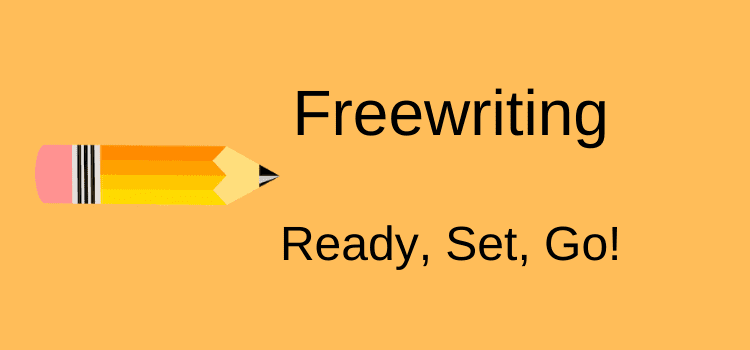
What is freewriting? It is a training technique for writers.
Peter Elbow is often accredited with inventing this technique.
He mentions it in his book, Writing Without Teachers, published in 1973.
“The consequence [of writing] is that you must start by writing the wrong meanings in the
wrong words; but keep writing until you get to the right meanings in the right words.
Only in the end will you know what you are saying.” – Peter Elbow, Writing Without Teachers
How does freewriting work?
Freewriting is a way of honing your skills as a writer.
But the idea behind the process has probably been around for much longer.
It is a simple writing exercise that frees you from any constraint.
All you do is write.
You set yourself a time limit of 5, 10, or 15 minutes and write without thinking or stopping.
It’s a bit like being invited to make a speech at a wedding without knowing you had to speak.
But somehow you manage to fill 3 to 5 minutes talking about the bride and groom.
But instead of talking, you write.
You don’t need to worry about the result.
Simply get the words out.
Training your writing muscles
Athletes compete once or twice a month. But they train every day.
It is similar for writers. You need to write every day.
Instead of going for a five-mile run in the morning, a writer can do a 15-minute writing warm-up.
All you need to do is set aside a few minutes each day to let your mind take over your fingers.
It doesn’t matter if you use a computer or a pen and paper as long as you keep your mind and hands moving and writing.
In fact, changing your writing tools is a terrific way to get your brain working.
All you need to do is write and don’t stop writing for your set period of time.
Like an athlete going for a morning jog, you just keep running.
Freewriting techniques
When you sit down to write, write, write, and keep writing.
Feel free to take whatever is on your mind and write about it for your allocated time.
Don’t worry if you repeat yourself or make spelling or grammar mistakes.
Don’t think about paragraphs and formatting.
The aim is to write instead of speaking about what is on your mind. Grab the first word that enters your head.
One way I find helpful to keep writing if you run out of ideas is to take the last word in a sentence and then write about it.
I didn’t wake up happy this morning. The morning was sunny and warm. But warm is not my cup of tea.
Well, I prefer coffee to tea, but who cares what I like for breakfast?
Breakfast is just a short period of time between waking up and tackling the dramas of the day.
You will be surprised by how many great ideas you can come up with when you let your mind and fingers run free.
Use an image prompt
Another way is to use a picture as a writing prompt. It can work very well for a short story.
I use this with my English students. But instead of writing, they need to talk for one and a half minutes.
The aim is to talk about what happened before, what is happening now, and what is going to happen.
You can use the same technique when you are writing.
Here is an example image prompt that would suit budding romance writers.

How did they meet? What are they doing now? What is going to happen next?
I’ll take a break from writing this article right now. I’m off to do a 5-minute writing exercise about my sticking caps lock key on my expensive MacBook Pro.
I can have a moan and then finish writing this post on my 7-year-old MacBook Air.
It could end up being great material for a guest article on a tech blog.
From freewriting to real writing
Is a draft the same?
No, it is not formal writing as such. But you can use one to help the other.
When you read your writing, you might think that what you freewrite is rubbish.
In all likelihood, it will be. But from it can come some gems you can use later when you write your first draft.
Always save or keep what you write. Every word can have value later when you are hunting for ideas.
Some time ago, I free-wrote about the word something. That led me to write about anything and nothing.
Months later, when I was writing a blog post about indefinite pronouns, I had a text ready to hone, edit, and use.
Another time, I free-wrote about burning my toast one morning.
Months later, when I was hunting for ideas to write about on my personal blog, my ramblings became a monologue about an electric toaster.
It can work for books too. On my birthday, many years ago, I suddenly realized that my birthday was an ordinal number.
Just like the kings and queens of England. Henry the Eighth, Charles the First, and Elisabeth the Second. So I started free scribbling.
Months later, I started to write a sci-farce novel called February The Fifth.
To a good writer, every word you write has value, and you always work at polishing your writing.
There are no rules
Like all great writers, you can make up your own writing rules.
It is not like the Pomodoro Technique, where you set your strict writing time, then a defined break period, and then another writing stint.
Freewriting is a once-a-day exercise. Set your time limit, and let your fingers do the talking. But don’t think; just write and keep writing.
The exercise aims to practice moving your thoughts into text. You are free to write about anything, and no one is going to read or criticize your writing. It’s just between you and you.
Then file, save, or keep what you wrote and forget about it.
Until one day, when you find that you can turn your ideas into great writing.
Summary
If you are new to writing, it is a fantastic way to develop your writing skills quickly. All it takes is a few minutes a day.
It doesn’t matter if you write content marketing articles, personal blog posts, poetry, or long-form fiction. Writing is writing.
Like an athlete, set yourself a daily training schedule. Lock in five to ten minutes a day to train to help you improve and become a better writer.
Remember that you will never have anything to edit and improve if you have a blank page and no words to work with.
Is it ready, set, go for you?
Related Reading: Is the Pronoun None Singular Or Plural?



